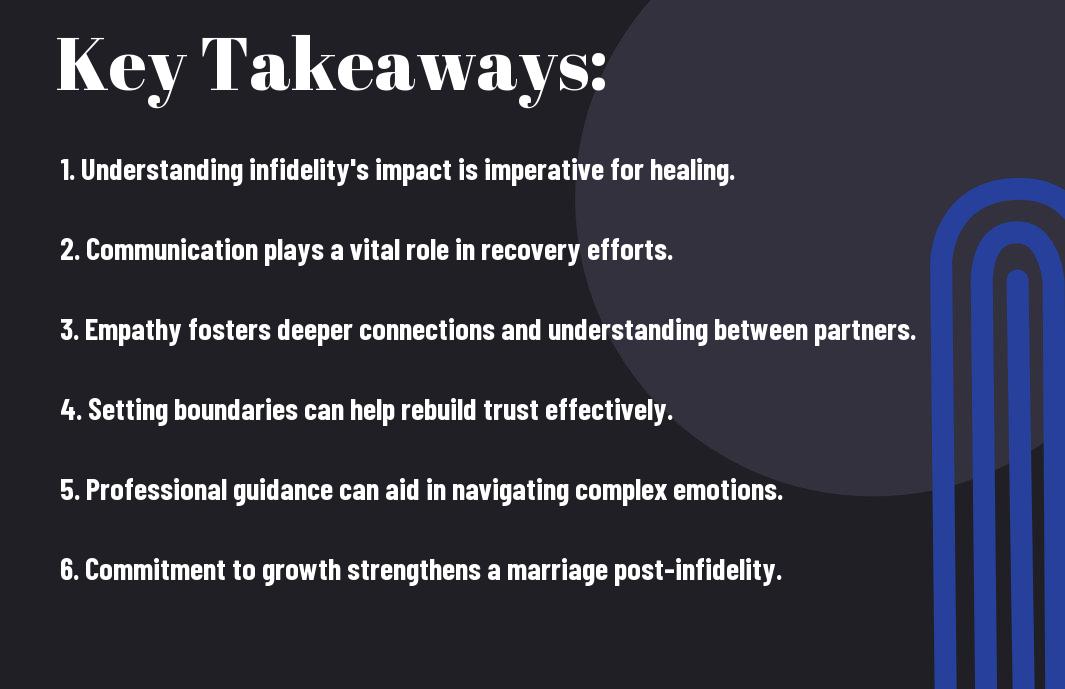Infidelity can shatter your relationship, leaving you feeling lost and heartbroken. However, you can find hope and healing through insightful literature. The best books on infidelity recovery offer practical advice and emotional support tailored to your unique journey. With the right guidance, you can navigate the tumultuous waters of betrayal and rediscover the strength in your marriage. This post will showcase recommended readings that will empower you to understand the root causes of infidelity, promote effective communication, and restore trust in your relationship. Let’s explore these transformative resources together.
Key Takeaways:
- Infidelity recovery involves understanding the complex emotions and dynamics that arise after a betrayal.
- Effective communication is necessary for couples to navigate their feelings and rebuild trust.
- Self-reflection and personal growth play a critical role in healing for both partners.
- Engaging in couples therapy can provide guidance and support throughout the recovery process.
- Setting realistic expectations and allowing time for healing can foster a healthier relationship.
- Exploring the underlying issues that contributed to the infidelity can help prevent future occurrences.
- Literature on infidelity recovery can offer practical strategies and insights for couples seeking to restore their marriage.

Understanding Infidelity
To navigate the complexities of infidelity, it is crucial to comprehend its underlying factors and the emotional turmoil it causes. Infidelity often leaves deep scars on relationships, leading to feelings of betrayal, anger, and confusion. Understanding this phenomenon allows you to address the pain it brings and enables you to make informed decisions about your marriage. Recognizing the reasons behind infidelity can empower you and your partner to confront the challenges and work towards healing.
The Psychology of Betrayal
One of the most profound aspects of infidelity is its psychological impact on both partners. Betrayal triggers a deep sense of loss and insecurity, challenging your perceptions of trust and love. As you process this emotional upheaval, understanding the psychology behind betrayal can shed light on your feelings and reactions, helping you to find a path forward in healing your marriage.
Common Reasons for Infidelity
Infidelity can arise from various factors within a relationship. Often, it is linked to unmet needs, lack of emotional connection, or growing apart over time. Understanding these dynamics can provide valuable insights into your marriage’s struggles and help you identify patterns that led to infidelity.
Reasons for infidelity can be complex and multifaceted. In many cases, individuals seek the excitement of a new relationship due to emotional dissatisfaction or a sense of emptiness in their current marriage. Some may engage in infidelity to escape from personal issues or unresolved conflicts, while others may find themselves caught in a cycle of impulsivity. It’s also important to consider that external factors, such as influence from peers or life changes, can play a significant role in these choices. Recognizing these reasons can aid in understanding your situation and fostering open dialogue in your relationship.
Initial Steps After Discovery
While the discovery of infidelity can be devastating, taking initial steps can set the foundation for healing. Begin by allowing yourself the space to understand your feelings and processing the event. This is a critical time for you to reflect on what happened and check in with your emotional state. Give yourself permission to feel hurt, betrayed, or confused, as these emotions are valid responses to such an upheaval in your relationship.
Immediate Reactions and Responses
Reactions to discovering infidelity can range from shock to anger. You may feel an overwhelming need to confront your partner or isolate yourself. It’s necessary to acknowledge these feelings and allow yourself to express them in ways that won’t further complicate matters. Avoid making hasty judgments or decisions during this tumultuous time; instead, focus on processing what you feel.
Communicating with Your Partner
Responses to your partner should be aimed at fostering open communication. You may feel the urge to confront them immediately, but consider waiting until you’re calmer. Steps to effective communication include finding a time when both of you are ready to talk. Approach the conversation with a mindset of understanding. Ask questions about their actions and share your feelings without resorting to blame. By clearly articulating your emotions and listening attentively to their perspective, you can initiate a dialogue that leads to greater understanding, even amidst the pain. Staying respectful will help keep the conversation productive and minimize further emotional damage.

Healing as a Couple
Despite the pain and turmoil that infidelity brings, healing as a couple is possible if both partners commit to the process. By working together to understand the underlying issues and embracing open communication, you can create a safe space to explore your emotions. This chapter will guide you on the journey to rebuilding your relationship stronger than before, emphasizing teamwork and mutual support.
Rebuilding Trust
An imperative part of healing together involves rebuilding trust, which may have been shattered during the affair. This requires transparency, honesty, and consistent actions that demonstrate a commitment to the relationship. Both partners should actively participate in conversations, addressing feelings and concerns while working towards a shared vision of the future.
Establishing Healthy Boundaries
Rebuilding your relationship also means establishing healthy boundaries that protect both of you from future hurts. By agreeing on what is acceptable and what isn’t, you create a framework for mutual respect. It’s important to take the time to communicate personal needs and desires.
For instance, discussing how you will handle interactions with friends or colleagues who may have been involved or even aware of the infidelity can help avoid potentially dangerous situations. Setting clear communication channels and defining time apart versus quality together can have a positive impact on your healing process. Establishing these boundaries not only aids in your recovery but also helps rebuild a foundation of trust that strengthens your marriage.

Individual Healing Journey
Unlike what you may believe, healing from infidelity is a deeply personal journey that requires you to focus on your own emotions and needs. It involves understanding your feelings, processing your pain, and building a stronger sense of self. This journey is not linear; it takes time, patience, and self-compassion. Embracing your individual healing allows you to gain clarity, allowing you to decide how to navigate your marriage moving forward, whether that leads to reconciliation or personal growth.
Self-Care Practices
One of the most effective ways to support your individual healing journey is through self-care. Engaging in activities that nourish your physical, emotional, and mental well-being fosters resilience. Consider practices like journaling, meditation, exercise, or even enjoying a creative hobby. By prioritizing self-care, you empower yourself to process your emotions and build a foundation of strength important for your recovery.
Seeking Professional Help
By recognizing the need for professional support, you open up new avenues for healing. A therapist or counselor who specializes in infidelity can offer valuable insights and coping strategies tailored to your unique situation.
To make the most of seeking professional help, it’s important to choose a provider who resonates with you, as the right fit can dramatically enhance your healing process. Therapy can provide a safe space for you to express emotions and confront painful truths in a supportive environment. Additionally, a mental health professional can equip you with practical tools to better manage the upheaval brought by infidelity. Don’t hesitate to voice your concerns or seek a specialized approach that meets your needs; your journey is valid, and taking this step can lead to profound transformations in both your personal healing and your marriage.
Recommended Books for Recovery
Once again, entering into literature can provide valuable guidance on your journey to healing. You can explore 13 Books About Infidelity to Help You Recover and Rebuild …, which outlines various resources tailored to couples navigating infidelity. Each recommended book offers unique perspectives and tools, allowing you to choose the best path for your recovery.
Top Selections for Couples
Selections will help you find literature specifically designed for couples seeking to rebuild trust and connection after betrayal. Look for titles that focus on communication strategies, empathy development, and rebuilding intimacy to foster a healthier relationship moving forward.
Insights from Leading Experts
An insightful approach to recovery can be found in books authored by leading relationship experts. These texts provide a wealth of research-based strategies and practical advice tailored for real-life application following infidelity.
Even more importantly, engaging with these insights equips you with proven techniques to manage emotional aftermath and guides you in navigating difficult conversations. Many experts emphasize the significance of understanding underlying issues that led to the infidelity, focusing on personal growth and rebuilding trust. This informed perspective can be a game-changer in healing your relationship and fostering a deeper bond.
Developing a Stronger Marriage
After navigating the turbulent waters of infidelity, you have the opportunity to rebuild and strengthen your marriage. Focusing on communication, trust, and mutual understanding can help create a more resilient bond. By actively working together and addressing underlying issues, you can transform your relationship into one that thrives on transparency and partnership, laying the foundation for a healthier future together.
Long-Term Strategies for Unity
LongTerm commitment to unity requires both partners to engage in honest conversations and establish shared goals. Regularly checking in with each other about feelings, boundaries, and expectations can prevent misunderstandings and foster a deeper connection. Identifying and embracing each other’s strengths while addressing weaknesses together will enable you to navigate challenges collaboratively.
Fostering Emotional Connection
Any efforts you make to rebuild your marriage should prioritize fostering an emotional connection. This connection lays the groundwork for intimacy and trust. You can achieve this by regularly expressing love and appreciation, engaging in meaningful conversations, and participating in activities that you both enjoy. These shared experiences build a sense of partnership and mutual respect, vital for long-term recovery.
Emotional connection is a key element in revitalizing your relationship after infidelity. Prioritize open and honest communication to express your feelings and concerns without judgment. Engage in activities that foster intimacy, whether it be sharing a meal, enjoying a hobby, or simply spending quality time together. It’s vital to validate each other’s feelings and to understand how the infidelity has impacted your partner on a deeper level. By continuously nurturing this emotional bond, you create a safer space where both you and your partner can heal and grow stronger together.
Conclusion
On the whole, finding the best books on infidelity recovery can significantly aid you in healing your marriage and restoring trust. Each recommended title offers unique insights and practical strategies to navigate the emotional turmoil and rebuild your relationship. By engaging with these resources, you empower yourself to better understand both your feelings and your partner’s, fostering an environment conducive to healing. Take the first step towards recovery today, and invest in your marriage’s future with the knowledge and tools these books provide.
FAQ
Q: What are some recommended books for couples dealing with infidelity?
A: There are several well-regarded books for couples navigating the complex emotions and challenges of infidelity. Titles like “After the Affair” by Janis Abrahms Spring provide practical strategies for healing, while “Healing from Infidelity” by Michele Weiner-Davis offers insights on rebuilding trust and intimacy. Other noteworthy mentions include “Not Just Friends” by Shirley Glass and “The State of Affairs” by Esther Perel, which explore the underlying issues and can help guide couples towards recovery.
Q: How can reading a book help in the recovery process from infidelity?
A: Reading books on infidelity recovery can provide necessary insights into the dynamics of betrayal and trust. They often equip readers with tools for communication, strategies for emotional healing, and ways to rebuild a relationship. Many authors share personal stories that resonate, showing couples they are not alone in their struggles. These resources can also offer a shared framework to discuss feelings and experiences, facilitating important conversations between partners.
Q: Are there specific books that focus on forgiveness in the context of infidelity?
A: Yes, many books address the theme of forgiveness within infidelity recovery. “Forgiving What You Can’t Forget” by Lysa TerKeurst is a powerful read that emphasizes the process of healing through forgiveness. Similarly, “The Gift of Forgiveness” by Katherine Schwarzenegger Prout shares stories and insights on how to navigate forgiveness, making it a valuable resource for couples seeking to restore their marriage after betrayal.
Q: How can I choose the right book for my situation?
A: Selecting the right book depends on your specific needs and circumstances. Consider what aspects of recovery you want to focus on, such as rebuilding trust, understanding infidelity, or improving communication skills. You might also want to read reviews or summaries online to see which books resonate with you. It can be beneficial to explore different perspectives by reading multiple books so you can gather a variety of strategies and insights.
Q: Should I read these books alone or with my partner?
A: Reading these books can be beneficial both individually and together. Solo reading allows for personal reflection and self-understanding, while reading together can promote openness and shared experiences. Many couples find it helpful to discuss concepts and insights as they progress through the material, creating opportunities for dialogue about their feelings and recovery journey.
